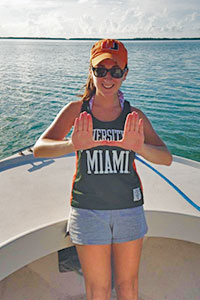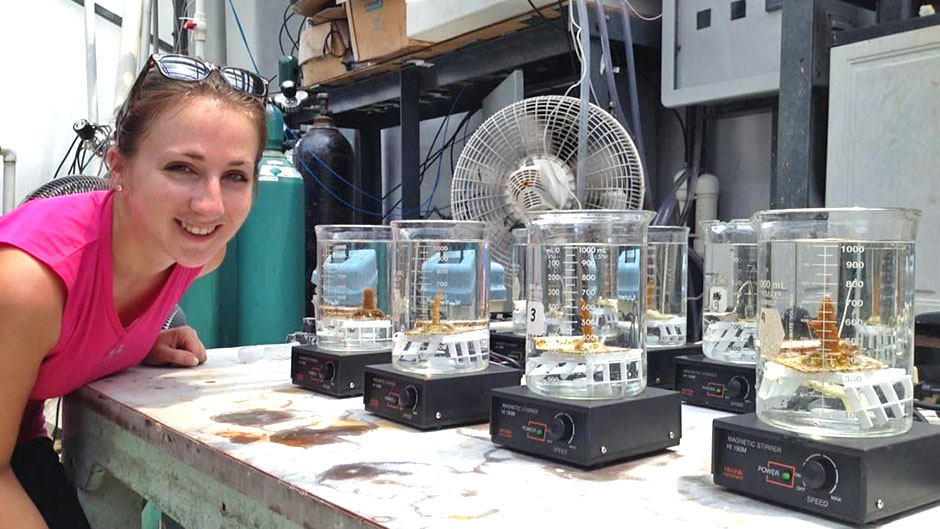Erica Towle, B.S.M.A.S. ’10, Ph.D. ’15, has always been fascinated by the ocean. She spent her childhood exploring marine life in New England tidal pools, searching for horseshoe crabs in Cape Cod, and dreaming of becoming a marine biologist.
But it was as a student at the University of Miami Rosenstiel School of Marine and Atmospheric Science, just a few steps away from the Florida Reef Tract, that she first became interested in corals. A study abroad trip to Australia, where she studied coral ecology and explored the Great Barrier Reef, would solidify that passion and lead her to devoting her career to studying corals and finding ways to save them.
“There are so many threats to coral reefs and yet there’s so much we still don’t understand,” she said. “And that was very intriguing to me.”
She focused on the science first, earning her Ph.D. in marine biology and ecology, and conducting research to understand how to make corals more resilient to the combined stresses of ocean warming and ocean acidification.
And though the traditional path might have been to remain in academia or research, Towle felt that if she wanted to have a more direct impact on conservation, she needed to learn about conservation policy. “I wanted to figure out how science translates into policy,” she said. “How does something like the Coral Reef Conservation Act even happen, for example? How does that come into existence?”
These questions took her to Capitol Hill, where she spent a year learning how to go from reading and writing about science to writing policy that protects natural resources.
And so, after going from hard science to hard policy, she needed to find a position that allowed her to combine both. She found it at the National Oceanic and Atmospheric Administration (NOAA), where she has worked for the past six years.
As a National Coral Reef Monitoring Program coordinator at NOAA, Towle coordinates research teams to collect and monitor data about the state and health of all ten coral reef ecosystems in the U.S. and the communities connected to them. Those data are then used by a variety of stakeholders.
For Towle, the best part of the job and the aspect she is most proud of is how the data are provided and tailored for people at different levels - whether it’s other academics and scientists, reef managers at local or state government levels, or policy makers in Congress and other non-scientists.
Recently, she helped produce and publish a first-of-its-kind report geared specifically to the public and policy makers. NOAA’s National Status Report for U.S. Coral Reefs, which features infographics and is written in plain language, explains the status of coral reefs in a way that non-scientists can understand.
“Making sure that you’re communicating clearly to people, and especially the people who make decisions, that there’s a problem is really important when you’re trying to move the needle on conservation,” she said. The team is using the report to advocate for the reauthorization of the Coral Reef Conservation Act.
The double ’Cane attributes her success in large part to the faculty, resources, and programs at Rosenstiel, including the study abroad program and the opportunities for research and hands-on field experience from the very first week. “I do think I got to where I am because of Rosenstiel,” she said. “To manage programs like the one I manage, it really helps if you have in-depth knowledge of coral physiology and a strong background in science. And I can't imagine a better place to be able to study coral science.”
She is also grateful for the community and the network she was able to build. In fact, she still collaborates with many Rosenstiel faculty members and alumni. Six of the 22 authors of NOAA’s recent report, for example, are Rosenstiel alumni.
And though she may sometimes miss being in the field, she’s grateful to be at what she sees as her dream job. “It's a very funny feeling to be a marine biologist or coral scientist living in DC, but people have different skill sets and different strengths and weaknesses. Hopefully, I'm able to blend my technical science background and policy knowledge to make more of a change towards conservation here.”
Her advice to current students? “Don’t box yourself in. A lot of people don't realize that jobs like mine, at the intersection of science and policy, exist,” she says. “There's more you can do with a Ph.D. in coral science, for example, than just stay in a traditional academic path. Conservation is a really big task. And so, in order to be successful, we have to be multidisciplinary.”

